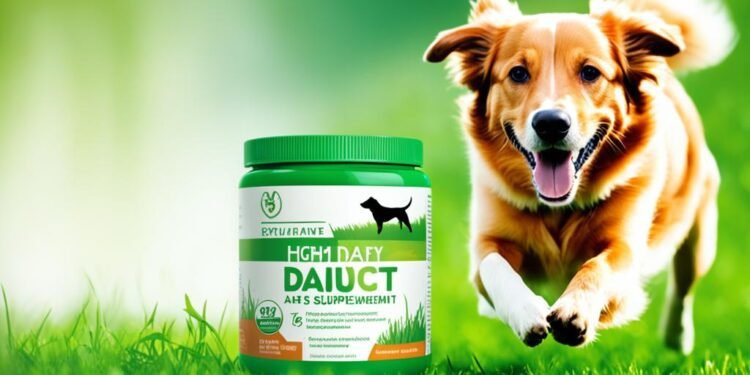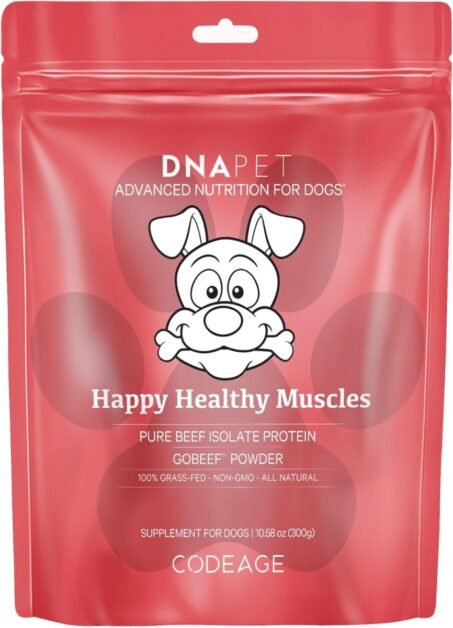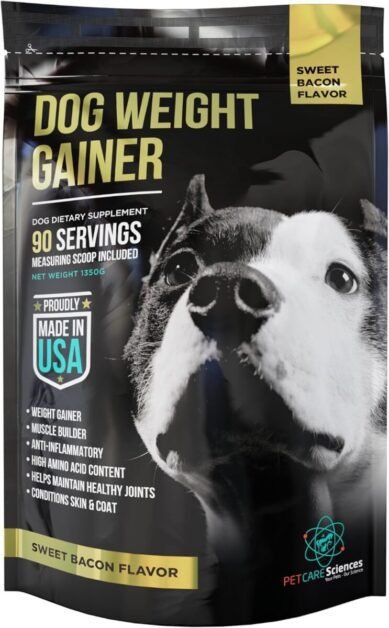Did you know 95% of dogs in the U.S. might not get enough protein? Protein is key for dogs, helping build muscles and support their health. It’s vital for puppies, active dogs, and seniors alike. They need the right amount of protein to stay healthy.
This guide will cover protein supplements for dogs. We’ll look at the benefits, types, and how to add them to your pet’s diet. By knowing the importance of protein and choosing the right supplements, you can help your dog be their best.
Key Takeaways
- Protein is an essential nutrient for dogs, serving as the building blocks for muscles, tissues, and vital bodily functions.
- Many dogs may not be getting enough protein in their diets, which can lead to various health issues.
- Protein supplements can help ensure your dog receives adequate levels of this crucial nutrient.
- Different types of protein supplements, such as powders, treats, and meal toppers, are available to meet your dog’s specific needs.
- Choosing the right protein supplement for your dog requires evaluating their individual nutritional requirements and the quality of the ingredients.
Table of Contents
Introduction to Protein Supplements for Dogs

Protein supplements for dogs are special products that add more protein to a dog’s diet. They come in different forms like powders, liquids, and treats. These supplements are made from various protein sources like meat, fish, eggs, or plant-based proteins like soy or peas.
What are Protein Supplements for Dogs?
These supplements help increase a dog’s protein intake. They can be added to a dog’s regular food or given as a protein source on its own. Dogs with high energy levels, recovering from illness, or needing special nutrition often use these supplements.
Importance of Protein in a Dog’s Diet
Protein is key for dogs because it helps build and repair body tissues. It’s important for muscle growth, fixing tissues, supporting the immune system, making hormones and enzymes, and providing energy. The American Association of Feed Control Officials (AAFCO) says adult dog food should have at least 18% protein. Foods for nursing moms or puppies need 22% protein.
Dogs that are very active, like working dogs (for example, military or police dogs), might need more protein to keep up with their energy needs. Dogs getting over injuries or surgery also might need more protein to help with healing muscles, tendons, and ligaments.
| Protein Source | Digestibility |
|---|---|
| High-quality dog foods | 82-86% |
| Economy dog foods | Around 75% |
| Plant-based proteins (soy, wheat, corn) | Incomplete proteins |
| Animal-source proteins (lean meats, eggs) | Complete proteins |
It’s important for dogs to get balanced and complete protein to get all the essential amino acids they need for good health and happiness.
Signs Your Dog May Need Protein Supplements
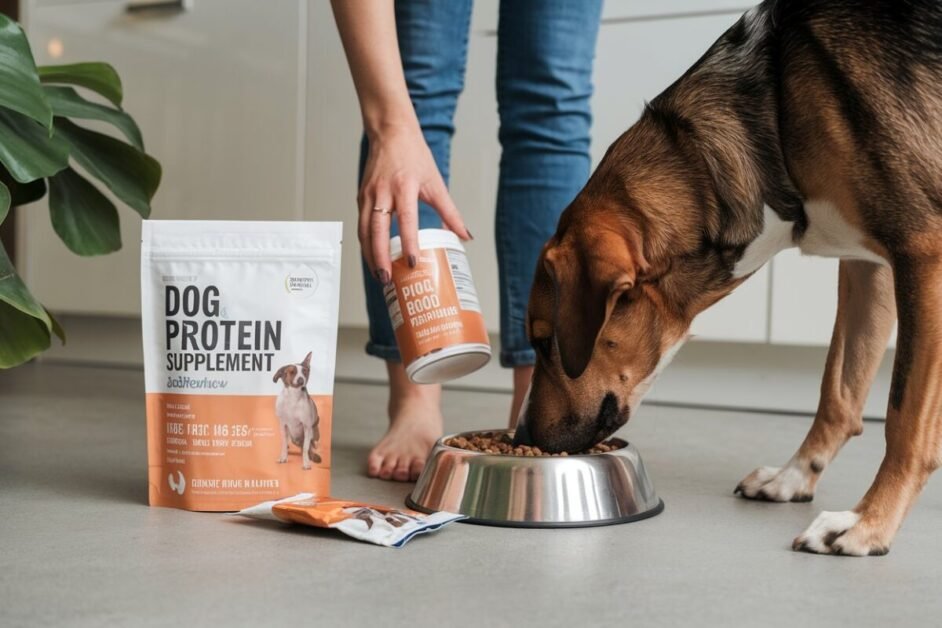
Figuring out if your dog needs protein supplements depends on many things. This includes their age, health, how active they are, and what they eat every day. Puppies, dogs that are very active, pregnant or nursing moms, and some older dogs might need more protein.
Puppies need more protein to help their muscles grow and repair. Dogs that are very active, like those bred for sports, use up more calories and need more protein. Pregnant or nursing dogs also need more protein to help their puppies grow and to make milk.
Some dogs with health issues or on special diets might also need protein supplements. For example, dogs with kidney disease might need less protein but still need all the nutrients they can get. Older dogs might need more protein to keep their muscles strong and stay healthy.
But, most dogs get what they need from regular dog food. Supplements are usually not needed for healthy dogs on a balanced diet. Always talk to your vet to see if your dog really needs supplements. They can help you figure out the right amount and type.
| Dog Life Stage | Protein Needs |
|---|---|
| Puppies | Higher protein requirements for muscle development and tissue repair |
| Highly Active Dogs | Increased protein needs due to higher calorie burn |
| Pregnant/Lactating Females | Elevated protein requirements to support developing puppies and milk production |
| Senior Dogs | Potential benefit from higher protein intake to prevent muscle mass loss |
| Dogs with Health Conditions | May require protein supplements based on dietary needs |
Always talk to your vet to see if your dog could use protein supplements. They can help you find the right kind and how much to give.
Types of Protein Supplements for Dogs
There are many types of protein supplements for dogs to support their health. These supplements can be a great addition to your pet’s diet. They meet their specific nutritional needs. Let’s look at the different options to help you choose the right one.
Protein Powders
Protein powders are packed with protein and easy to add to your dog’s meals. They come from sources like whey, casein, or plant-based proteins. Adding the powder to their food or water gives your pet a protein boost.
Protein-Rich Treats
If your dog is picky or needs more protein, protein-rich dog treats are a good choice. These treats are made to be high in protein. They help your dog get more protein-rich foods.
Meal Toppers
Dog protein meal toppers are wet or semi-moist foods with lots of protein. You can mix them with your dog’s kibble to increase the protein in their meals. They’re great for dogs who don’t eat well or need a varied diet.
Canned or Wet Foods
High-protein dog canned or wet foods can also be a protein supplement. They usually have more protein than dry kibble. This makes them perfect for dogs needing more protein.
Knowing about the different protein supplements for dogs helps you meet your pet’s nutritional needs. Always talk to your vet to find the best supplement for your dog.
Benefits of Protein Supplements for Dogs
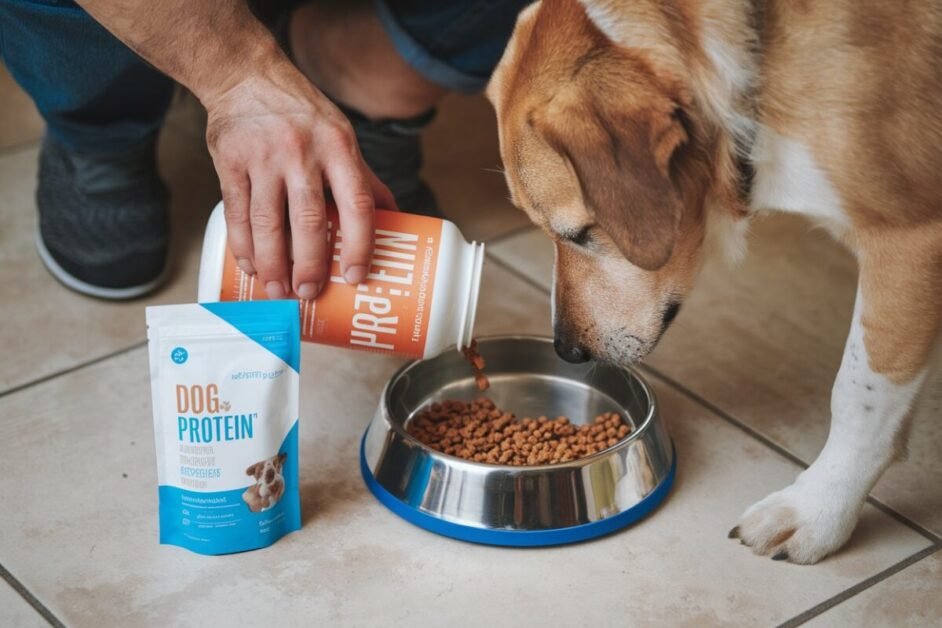
Protein supplements offer many benefits for dogs. They help with muscle growth and repair, support tissue recovery, and boost the immune system. Adding these supplements to a dog’s diet can be very helpful.
Muscle Development and Maintenance
Proteins are key for building and keeping muscles strong. This is crucial for active dogs, working breeds, and young dogs. Protein supplements make sure your dog gets the right amount of protein for strong muscles.
Tissue Repair and Recovery
Protein is also key for fixing and recovering tissues. This is vital for dogs recovering from illness, injury, or stress. Protein supplements help your dog heal faster and recover quicker.
Immune Function Support
Proteins are important for a dog’s immune system to work right. They support overall health and help your dog fight infections better. This means your dog can stay healthy and fight off sickness more effectively.
When picking protein supplements for dogs, choose high-quality ones. Always talk to your vet to find the best type and amount for your dog. With the right supplements, your dog can live a healthier, happier life.
Choosing the Right Protein Supplement for Your Dog
When picking a protein supplement for your dog, think about a few key things. Make sure the supplement is safe and right for your dog’s needs. Look at your dog’s nutritional needs, the quality of the protein sources, and the ingredients. This way, you can pick a supplement that helps your pet stay healthy.
Assess Your Dog’s Nutritional Needs
Start by looking at your dog’s age, weight, and how active they are. Also, think about any health issues they might have. These things will help you figure out how much protein your dog needs. You might need to give more protein if your dog is growing, very active, or recovering from an illness.
Quality of Protein Sources
Check the quality and how easy to digest the proteins are in the supplement. Good options include chicken, turkey, beef, and lamb. Stay away from supplements with low-quality or unknown proteins. They might not be good for your dog.
Ingredient List Evaluation
Look over the ingredient list of the supplement. Check for fillers, additives, preservatives, or artificial stuff. Choose supplements with few, natural ingredients. This way, your dog gets pure, high-quality protein without extra stuff they don’t need.
| Protein Source | Benefits for Dogs |
|---|---|
| Lamb | Rich in protein, essential fats, iron, and Omega-3 fatty acids. Suitable for dogs with food allergies and picky eaters, but can be more expensive. |
| Turkey | Lean, highly digestible protein that supports healthy kidney function. Turkey is low in fat and can be beneficial for overweight dogs, making it an affordable option. |
| Beef | High-quality source of protein, essential fats, and nutrients. Helps build muscle mass and maintain a healthy coat and skin. Choose the fat content according to your dog’s needs. |
| Chicken | Lean, low-calorie protein rich in omega-6 fatty acids. Provides a reliable energy source for dogs, but avoid using spices and onions. |
Think about these things to pick a protein supplement that fits your dog’s needs. This way, your dog gets the best protein sources for their health and happiness.
Protein Supplements for Dogs: Boost Your Pet’s Health
Protein supplements are key for your dog’s health. They add extra protein to help muscles stay strong, aid in tissue repair, and boost the immune system. But, it’s important to talk to a vet to pick the right type and amount for your dog. Too much can cause health problems.
Dinovite is a top choice for dogs, with over 1,000,000 pets helped. It has more than 15,000 reviews and comes with a 90-day money-back guarantee. Dinovite includes prebiotics and 7 types of probiotics. This is because up to 70% of a pet’s immune system is in their gut.
WinPro Pet Immunity Blood Protein Dog Supplement also boosts your dog’s immunity. It helps with loose stools, stops diarrhea and vomiting, and keeps the gut working right. This supplement fights off things that can weaken your dog’s immune system.
When picking a protein supplement, look at the protein sources and what’s in it. Talk to your vet to make sure you’re giving your pet the best supplement. This helps avoid side effects or giving too much.
“Dinovite has been in business for over 20 years and has a US-based customer support team available from 9 AM to 7:30 PM from Monday to Friday.”
Adding protein supplements to your dog’s diet boosts their health. It supports muscle growth, tissue repair, and immune function. With your vet’s advice, you can make sure your dog gets the best nutrition.
- SUPPORTS DIGESTION & GUT HEALTH – Maintain a healthy gut with essential prebiotics and probiotics for dogs.
- SUPPORTS HEALTHY SKIN AND COAT – Our unique formula is rich in omega fatty acids to support heathy skin and coat.
- PROMOTES A HEALTHY IMMUNE SYSTEM – Strengthen your dog’s immune system by adding this daily supplement to their regular …

- 60 Count of WINPRO Dog Allergy Chews : Our natural, grain-free soft chews are formulated to support dogs with itchy skin…
- Plasma-Powered Solution : Featuring K-Thrive Formula D, a proprietary blend of natural blood proteins that delivers powe…
- We Believe Pet Allergy Support Starts At The Source: WINPRO combines spray-dried plasma with effective natural ingredien…








- Vital Essentials Freeze Dried Dog Food packs more quality protein in every bite than industry standard to deliver the pe…
- The Best Freeze Dried Dog Food on the market. Better Protein = Better Results: Butcher cut raw taps into the protein-ric…
- Proudly Made in the USA: We offer the largest variety of single ingredient dog foods and treats, relying on 13+ decades …








- 11-in-1 POWERFUL MUSCLE BUILDING CHEWS: Transform your dog into a muscular powerhouse with Bully Max Muscle Gain Pro Ser…
- HIGH-QUALITY PROTEIN & AMINO ACID SUPPLEMENT: Bully Max 11-in-1 High Protein Dog Supplement is a powerful addition to yo…
- ADVANCED ANTIOXIDANT PROTECTION WITH ASTAXANTHIN: Our Power Chews include 5 mg of Astaxanthin, a potent antioxidant sour…








- HELPS DOG GAIN WEIGHT: All American Canine powder helps dogs to gain healthy weight fast. Our powder is a high-calorie w…
- HEALTHY WEIGHT SUPPLEMENT: Our premium weight gainer is formulated with a unique blend of high-quality ingredients worki…
- USEFUL INGREDIENTS: Beef broth protein powder, whey protein, ground flaxseed, beef, liver powder, sweet potato powder, p…








Protein Sources for Dog Supplements
When thinking about adding extra protein to your dog’s diet, you have many options. These options fall into two main types: animal and plant sources.
Animal-Based Protein Sources
Animal-based proteins are easy for dogs to digest and give them all the amino acids they need. Here are some top choices:
- Beef
- Turkey
- Chicken
- Lamb
- Pork
- Venison
- Salmon
Lamb is good for dogs with food allergies because it has iron, omega-3 fatty acids, and makes picky eaters happy. Turkey is lean and easy to digest, helping keep your dog’s kidneys healthy.
Plant-Based Protein Sources
Even though animal proteins are better digested, plant proteins can still be great for your dog. Here are some plant-based options:
- Soy (11g per 0.5 cup)
- Quinoa (8.14g per cup)
- Buckwheat (4g per cup, cooked)
- Chickpeas (20g per cup, cooked)
- Barley (4g per cup, cooked)
- Oats (10g per cup, rolled)
- Green peas (8g per cup, cooked)
When picking a protein supplement for your dog, make sure to look at the quality and how easy it is for your dog to digest. This way, your dog gets the most nutritional benefits.
Dosage and Administration of Protein Supplements
Choosing the right amount and way to give protein supplements to your dog is key for their health. The right dose depends on your dog’s age, size, how active they are, and their health.
Always read and follow the instructions from the maker and talk to your vet to find the right dose for your dog. Dogs can get protein supplements in powder, liquid, or treat forms. You can add them to your dog’s food or give them as a special treat.
Factors to Consider
- Your dog’s age, size, and activity level
- Your dog’s overall health condition and any underlying medical issues
- The specific protein supplement and its recommended dosage guidelines
- Consulting with your veterinarian to ensure the appropriate dosage and administration
Administering Protein Supplements
- Powder Supplements: Mix the recommended amount of powder into your dog’s regular food or water.
- Liquid Supplements: Measure the appropriate dosage and either mix it into your dog’s food or administer it directly using a syringe or dropper.
- Treat-Based Supplements: Offer the recommended number of treats as a standalone supplement or as part of your dog’s daily routine.
Start with a small dose and slowly increase it if needed, watching how your dog reacts. Stop or talk to your vet if you see any bad effects.
| Supplement | Protein Content | Calorie Content | Recommended Dosage |
|---|---|---|---|
| Pro-Stat Peach with Fiber | 15 g per 1 fl oz | 100 calories per 1 fl oz | 1-3 servings per day, under medical supervision |
| Wholistic Spirulina | 60% digestible vegetable protein | N/A | Follow manufacturer’s instructions |
Remember, the protein supplement dosage for dogs and how to administer protein supplements to dogs can change. Always work with your vet to find the best way for your dog.
- Natural Dog Nutrition: Made from raw, natural whole food ingredients, this certified organic spirulina powder for dogs i…
- Immune & Energy Boost: Wholistic spirulina for cats helps stabilize your canine’s immune system, which can provide more …
- Natural and Safe Ingredients: Our supplement for pets is free from fillers, synthetics, GMOs, and artificial flavors. It…








- CONCENTRATED LIQUID PROTEIN: For the dietary management of wounds and other conditions requiring increased protein in lo…
- MEDICAL FOOD: Use under medical supervision.
- READY-TO-DRINK: 1 fl oz provides 15 g of hydrolyzed collagen protein and 100 calories.








Potential Side Effects and Precautions
Protein supplements can be good for some dogs, but it’s key to know the risks. Too much protein can harm dogs, especially those with health issues. Some dogs might react badly to certain proteins in supplements.
Always watch how your dog acts and talk to a vet before adding supplements. Here are some possible side effects of protein supplements for dogs:
- Gastrointestinal issues like nausea, vomiting, or diarrhea
- Increased thirst and urination
- Weight gain or loss
- Liver or kidney problems
- Allergic reactions, such as skin irritation or respiratory distress
To keep your dog safe, follow the dosage advice from the supplement maker or your vet. Start with a little and see how your dog reacts. If you see bad effects, stop the supplement and call your vet right away.
Choosing good, quality protein supplements for dogs is also key. Go for ones with natural protein sources and no artificial stuff. This way, you can make sure your dog gets the benefits without risking their health.
| Side Effect | Potential Causes | Recommended Precautions |
|---|---|---|
| Gastrointestinal issues | Sensitivity to protein source, over-supplementation | Start with small doses, monitor reactions, and consult a vet |
| Increased thirst and urination | Potential kidney strain from excess protein | Ensure your dog’s protein intake is within recommended guidelines |
| Weight gain or loss | Imbalance in calorie and nutrient intake | Adjust supplement dosage and monitor your dog’s weight and body condition |
| Liver or kidney problems | Prolonged over-supplementation, underlying health conditions | Regular veterinary check-ups and blood work to monitor organ function |
| Allergic reactions | Sensitivity to specific protein sources or other ingredients | Choose hypoallergenic, high-quality supplements and watch for any adverse reactions |
“Consult your veterinarian before introducing any new supplements to your dog’s diet. They can help you determine the appropriate dosage and monitor for any potential side effects.”
Natural Alternatives to Protein Supplements
Commercial protein supplements can be good for some dogs, but there are natural options too. These whole foods give your dog the protein they need. They are high-quality and easy to digest, unlike processed supplements.
Lean meats like beef, turkey, chicken, and lamb are great for dogs. They help with muscle growth and give important nutrients like iron and zinc. Eggs are also top-notch, full of protein, healthy fats, and vitamins.
Fish such as salmon, cod, and flounder are good for dogs with sensitivities. They’re full of protein and omega-3 fatty acids. Venison and lean red meats are good for dogs with food allergies.
For plant-based options, lentils, peas, and chickpeas can work, but be careful. They might not be good for heart health.
Bone broth and organ meats like liver and kidney offer high-quality protein. They’re great for older dogs or those getting over illness.
Always talk to your vet before adding new foods to your dog’s diet. This ensures it meets their needs and avoids imbalances. Using these natural options helps your dog stay healthy without just relying on supplements.
| Protein Source | Benefits |
|---|---|
| Lean Meats (Beef, Turkey, Chicken, Lamb) | High-quality protein, essential nutrients like iron, zinc, and B vitamins |
| Eggs | Packed with high-quality protein, healthy fats, and important vitamins and minerals |
| Fish (Salmon, Cod, Flounder) | Rich in protein and beneficial omega-3 fatty acids, suitable for dogs with sensitivities |
| Venison and Other Lean Red Meats | Excellent protein source for dogs with food allergies, rich in nutrients like iron and zinc |
| Plant-Based Proteins (Lentils, Peas, Chickpeas) | Provide protein and fiber, but should be used in moderation due to ongoing health concerns |
| Bone Broth and Organ Meats | Easily digestible, nutrient-dense protein sources that can benefit older or recovering dogs |
“By incorporating natural protein sources into your dog’s diet, you can support their overall health and well-being without relying solely on commercial supplements.”
Signs of Protein Deficiency in Dogs
Protein is key for dogs, helping them keep muscles, skin, and fur healthy. But, some dogs might not get enough protein, leading to health issues. It’s important for owners to know the signs to keep their pets healthy.
Weight loss and muscle wasting are big signs of protein deficiency in dogs. Without enough protein, dogs lose muscle mass and look thin and long. Their fur also gets dull and dry, showing they need more nutrients for their skin and fur.
- Slow wound healing
- Lethargy and weakened immune function
- Susceptibility to infections and illness
Puppies and older dogs need more protein than others. Dogs with health issues like kidney or liver disease, or those on special diets, are also at risk.
| Breed | Prevalence of Protein-Losing Enteropathy (PLE) |
|---|---|
| Soft-coated Wheaten Terrier | Over-represented |
| Yorkshire Terrier | Over-represented |
| Maltese | Over-represented |
| Chinese Shar Pei | Over-represented |
| Rottweiler | Over-represented |
| Basenji | Over-represented |
| Irish Setter | Over-represented |
| Norwegian Lundehund | Over-represented |
If you see any signs of protein deficiency in dogs, talk to your vet right away. They can figure out why and help make a diet plan to get your dog healthy again.
Combining Protein Supplements with Other Supplements
As pet owners, we look for ways to help our dogs stay healthy with supplements. Protein supplements are great for dogs, but we must think about how they work with other supplements or medicines. Adding other supplements can help more, but always talk to your vet before starting new products.
Some supplements, like omega-3 fatty acids or probiotics, work well with protein supplements. Omega-3s help reduce inflammation and support joints. Probiotics boost the digestive system and immune function. Together, these supplements can improve your dog’s health in many ways.
Not every supplement mix is good for every dog. You need to think about your dog’s age, health, and nutritional needs. Your vet can help pick the right supplements and amounts to keep your dog safe and healthy.
Senior dogs might need more protein to keep muscles strong and support aging. Adding supplements like glucosamine and chondroitin can help. For overweight dogs, high-protein diets with fiber can help with weight control and overall health.
When picking supplements, read the labels carefully. Choose high-quality, dog-specific products. Stay away from supplements with artificial additives or harmful ingredients like xylitol.
| Supplement | Potential Benefits when Combined with Protein |
|---|---|
| Omega-3 Fatty Acids | Reduced inflammation, improved joint health |
| Probiotics | Enhanced digestive and immune system function |
| Glucosamine and Chondroitin | Supported joint health and mobility for senior dogs |
| Fiber-rich Supplements | Aided weight management and overall wellness for overweight dogs |
By mixing protein supplements with other supplements, you can make a great plan for your dog’s health. But, always talk to your vet before changing your dog’s diet or supplements.
Cost Considerations for Protein Supplements
The cost of protein supplements for dogs can change a lot. This depends on the type and quality of the protein, the supplement’s form, and how much you need. These factors can affect the price.
Recently, the dairy industry has seen higher costs. This has made things like whey protein more expensive. The market for powder dietary supplements is expected to grow by 7.7% each year. It’s set to reach $75.2 billion by 2032, which could also raise the price of protein supplements.
When picking a protein supplement for your dog, think about the cost and its benefits for your pet’s health. Talking to your vet can help you find a good and affordable option for your dog’s needs.
| Cost Factor | Impact on Protein Supplement Prices |
|---|---|
| Protein Source | Animal-based proteins (e.g., whey, casein) tend to be more expensive than plant-based options (e.g., pea, soy). |
| Supplement Form | Powders and liquids are generally more cost-effective per serving than treats or chews. |
| Quantity | Larger package sizes or bulk purchases can often provide a lower cost per serving. |
| Regulatory Compliance | Manufacturers must comply with standards like GMP and FSSC 22000, which add to the overall cost of production. |
| Packaging and Transportation | Shortages of essential packaging materials and transportation challenges have increased supplement costs. |
Understanding the different costs and talking to your vet can help you find a great protein supplement for your dog. It should be affordable and support your pet’s health.
Top-Rated Protein Supplement Products for Dogs
Top-rated protein supplements can greatly benefit your dog’s health and wellness. They are made to meet your dog’s nutritional needs. This includes muscle growth, joint health, and a shiny coat.
The DNA PET Happy Healthy Muscles Powder for Dogs is a great choice at $29.99. It’s packed with grass-fed beef isolate protein and all 9 essential amino acids. This makes it perfect for dogs of any age, especially big breeds. It also supports muscle health and vitality.
The Nature’s Diet Pet Bone Broth Protein Powder comes in five flavors. It’s rich in collagen and helps with joint, skin, and coat health. Plus, it’s non-GMO and free from many allergens.
For dogs needing to gain weight, the PET CARE Sciences Dog Weight Gainer is ideal. It adds about 600 calories per serving for safe and quick weight gain.
Other great options include the VICTOR Super Premium Dog Food – Hi-Pro Plus Dry Dog Food and the Purina Pro Plan High Protein Dog Food series. These high-protein foods support an active dog’s lifestyle and health.
These supplements are made with the best ingredients for purity and safety. They’re great for muscle growth, joint health, or weight gain. Vets and pet owners highly recommend them.
- Grass-fed, grass-finished beef isolate protein
- Contains all 9 essential amino acids
- Supports muscle health, repair, and growth
- Formulated for dogs of all life stages
- Non-GMO, dairy-free, and free from hormones, soy, grain, and gluten
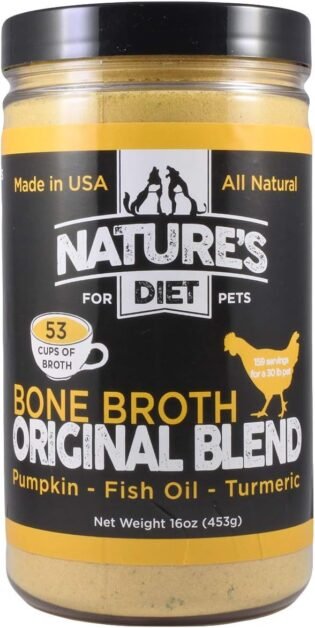

- Collagen-rich formula
- Supports joint health, mobility, skin, and coat
- Available in 5 different flavors
- Non-GMO, dairy-free, and free from hormones, soy, grain, and gluten
- Provides approximately 600 calories per serving
- Helps dogs in need of weight gain
- Suitable for all life stages
These top-rated protein supplements for dogs are made with the best ingredients. They ensure purity, safety, and maximum effectiveness. Whether you want to boost muscle, support joints, or help your dog gain weight, these supplements are highly recommended.
Recipes for Homemade Protein-Rich Dog Treats
You can make your own protein-rich treats for your dog instead of buying them. Use lean meats, eggs, cheese, and plant-based proteins like peanut butter or sweet potatoes. This way, you can control what goes into your dog’s treats and add extra protein.
A simple recipe makes about 28 treats with just three ingredients: peanut butter, carrot, and oats. It costs about $2.25 to make, much cheaper than store-bought treats that can be up to $16.
Carrots are full of nutrients like beta-carotene, which helps with vision and immune health. Oats add fiber, vitamin B, and omega-6 fatty acids. Each treat has 52 calories, 5g carbs, 2g protein, and 3g fat. These treats are a healthy and affordable choice for your dog.
When making homemade dog food, talk to your vet first. They can adjust recipes for your dog’s age, weight, and health conditions. This ensures your dog gets the right nutrients.
| Homemade Treat | Calories | Protein (g) | Fat (g) | Carbs (g) | Fiber (g) | Sugars (g) |
|---|---|---|---|---|---|---|
| Peanut Butter Banana Bites | 30 per bite | 1.5 | 1.5 | 3.5 | 0.5 | 2 |
| Cheesy Sweet Potato Chews | 30-40 per chew | 1 | 1 | 6 | 1 | 2 |
| Apple Cinnamon Cookies | 30-40 per cookie | 1 | 0.5 | 6 | 1 | 2 |
| Chicken and Rice Balls | 30-40 per ball | 2 | 1 | 4 | 1 | 1 |
Other homemade protein-rich dog treat ideas include:
- Peanut Butter Banana Bites
- Cheesy Sweet Potato Chews
- Apple Cinnamon Cookies
- Chicken and Rice Balls
- Carrot Crunchies
Always check with your vet before making homemade treats. They can make sure the recipe is right for your dog and warn you about allergies or sensitivities. Homemade treats let you control the ingredients and add extra protein and nutrients for your dog.
Conclusion
Protein supplements can be a great addition to a dog’s diet. They provide important nutrients for muscle growth, fixing tissues, boosting the immune system, and overall health. Knowing the different types of protein supplements and their benefits helps you pick the right one for your dog. This ensures your furry friend gets the nutrition they need to stay healthy.
But, it’s important to talk to your vet before adding any supplements to your dog’s diet. Too much of a good thing can actually harm your dog’s health. With the right guidance, protein supplements can be a big help in keeping your dog happy and healthy for a long time.
A study showed how important protein quality is in pet food. It found differences in how well nutrients are digested, and in the types of bacteria in the gut, based on the protein source. While many pet foods use animal by-products or fresh meat, more people are choosing plant-based proteins. These are seen as healthier and better for the planet, but they might need extra supplements because they don’t always have enough of certain amino acids.
















